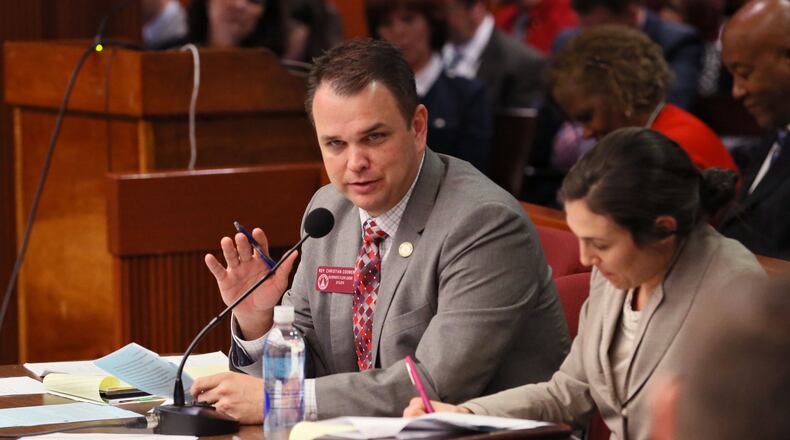Federal authorities are conducting a criminal investigation of suspended state Court of Appeals Judge Christian Coomer, The Atlanta Journal-Constitution has learned.
The AJC learned of the probe after the U.S. Attorney’s Office in Atlanta filed a court motion on Jan. 12 disclosing it had obtained search warrants to seize evidence from two online accounts used from 2016 to 2018 by an attorney at a small Georgia law firm.
The motion did not name Coomer, only referring to the person as “the attorney.” But the AJC has confirmed through people familiar with the case that Coomer is the attorney under investigation. Coomer practiced law as a sole practitioner in Cartersville until 2018, when then-Gov. Nathan Deal appointed him to the Court of Appeals.
The court filing also identified Atlanta lawyer Scott Grubman as the person representing “the attorney.” In a statement, Grubman said, “Due to a court order sealing certain information, I am unable to comment on this matter, including the identity of my client.”
The U.S. Attorney’s Office also declined to comment, spokesperson Bob Page said.
The U.S. Attorney’s Office’s court filing did not specify what possible crimes are under investigation by the FBI. According to court filings, the office wants to look at emails and text messages sent over a three-year period.
The motion also reads, “The U.S. Attorney’s Office for the Northern District of Georgia is conducting a criminal investigation of the attorney.”
Coomer, the former majority whip of the state House of Representatives, voluntarily agreed to a suspension in December 2019 when Georgia’s judicial watchdog agency filed ethics charges against him. Since then, Coomer has been suspended with pay — he earned $196,000 in 2020 — while Senior Judge Herbert Phipps filled in.
Coomer’s legal troubles began in earnest in March 2020 when a former client, 78-year-old Jim Filhart, sued him alleging fraud and legal malpractice. The suit said Filhart gave two loans totaling $289,000 to a holding company controlled by Coomer with extremely favorable terms to Coomer. At that time, Coomer was a private attorney.
One of the loans, for $159,000, was to be paid off when Filhart would have been 106 years old, if he lived that long. Coomer also prepared wills for Filhart that would have given Coomer access to nearly all of Filhart’s estate, the suit said.
After the suit was filed, Coomer told the AJC, “I completely and utterly deny the allegations of fraud. I can’t deny it strongly enough, because it’s absolutely untrue.”
Coomer settled the lawsuit with Filhart months later, paying him back in full.
In October 2020, the state ethics commission filed a separate complaint against Coomer. It alleged he violated state campaign finance laws by improperly transferring almost $22,000 from his former House campaign account into his personal checking account as well as his law firm’s bank account when it was low on funds.
In December, Coomer settled the ethics commission case by agreeing to pay a $25,000 fine.
The state Judicial Qualifications Commission charges remain pending against Coomer. When they were filed, Coomer’s civil attorneys, Dennis Cathey and Doug Chalmers, said the judge “strongly denies” the allegations.
The JQC complaint alleges the judge, when he was a lawyer, used his position to profit from Filhart’s estate and borrowed money from him on unfair terms. It also also accuses Coomer of repeatedly violating campaign finance laws.
In another allegation, the JQC said the day after the AJC first reported the lawsuit filed by Filhart against Coomer, Coomer submitted a mortgage application to SWBC Mortgage Corporation to get funds by refinancing his home. Those funds were ultimately used to help pay off Filhart’s loans, the JQC filing said.
The mortgage application required Coomer to list all his outstanding liabilities, yet he did not list the loans owed to Filhart in the application, the JQC filing said.
Coomer’s attorneys sought to get the complaint dismissed, contending he could not be disciplined for conduct that occurred before he became a judge. But Fulton Superior Court Judge Robert McBurney, who chairs the JQC’s hearing panel, recently issued a ruling that said the watchdog agency can bring charges of alleged misconduct that occurred before a judge took the bench.
On Tuesday, Coomer’s lawyers filed a petition asking the Georgia Supreme Court to overturn McBurney’s decision.
The recent filing by the U.S. Attorney’s Office regarding the search warrants addressed the use of what’s called a “filter team.” That is a group of federal prosecutors and FBI agents who would review a lawyer’s private communications to remove privileged email or text messages with clients.
In an order issued in December, U.S. District Judge Steven Grimberg noted that the emails and text messages being seized may include privileged communications with clients who are not a subject of the government’s investigation and clients who may face criminal liability in unrelated cases.
For this reason, Grimberg directed the U.S. Attorney’s Office here to assign a filter team of people who work in a Department of Justice office outside of Georgia and not in six other states where “the attorney” had clients. The judge also set up a review process for the production of communications related to the ongoing criminal investigation and the protection of those unrelated to it.
Staff writer J. Scott Trubey contributed to this article.
About the Author
The Latest
Featured





